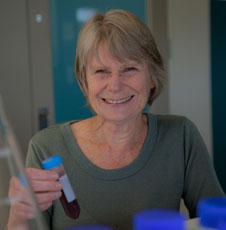 Monday 7 December 2015 4:17pm
Monday 7 December 2015 4:17pm
Professor Christine Winterbourn
International scientists will today celebrate the exceptional career of Professor Christine Winterbourn, whose research in the area of free radical science has spanned more than four decades.
Professor Winterbourn was the first woman to win New Zealand's top science prize, the Royal Society's Rutherford Medal.
She is being honoured today at a Festschrift (a day of lectures to honour an academic's exceptional career) at the University of Otago, Christchurch. Professor Winterbourn has spent most of her long and productive career working at the University's Christchurch health campus.
Professor Winterbourn's Festschrift is also the beginning of an international conference of free radical scientists.
See programme (PDF format,549KB)
Professor Winterbourn's colleague at the Centre for Free Radical Research, Professor Tony Kettle, says her career is exceptional and her discoveries have changed both free radical research and our understanding of the process of many common but often deadly or debilitating diseases.
“Professor Winterbourn was one of the first scientists to demonstrate our cells produce free radicals as part of their normal function. She went on to characterise some of the chemical reactions of free radicals that we now know occur in diseases such as cancer, stroke, coronary heart disease and arthritis,'' Professor Kettle says.
In 2011, Professor Winterbourn was awarded the country's top science and technology honour, the Rutherford Medal. She was the first woman to receive the medal in the 20 years it had then been awarded.
In 2004 Professor Winterbourn received the highest research award from the University of Otago, the Distinguished Research Medal, along with being awarded an Anniversary Medal from Massey University where she completed her PhD. These awards add to others she has received from the Royal Society and Government over the years.
Professor Kettle says her expertise as one of the founders of free radical research in biological systems is recognised around the globe.
She came to Christchurch in the early 1970s after first doing a MSc at Auckland University, a PhD at Massey University, and working as a post-doctoral scientist in Canada.
Professor Winterbourn says the field of free radical science has changed dramatically in the decades she has been involved.
“Nowadays, free radicals and anti-oxidants are terms many people are familiar with as they are often linked to fruit and vegetables and healthy eating. When I first started work on free radicals the term was common in chemistry but the idea that free radicals might have an important role in health and disease was relatively untouched.”
For further information, contact
Kim Thomas
Communications Manager
University of Otago, Christchurch
Tel 027 222 6016
Email kim.thomas@otago.ac.nz
A list of Otago experts available for media comment is available elsewhere on this website.
Electronic addresses (including email accounts, instant messaging services, or telephone accounts) published on this page are for the sole purpose of contact with the individuals concerned, in their capacity as officers, employees or students of the University of Otago, or their respective organisation. Publication of any such electronic address is not to be taken as consent to receive unsolicited commercial electronic messages by the address holder.